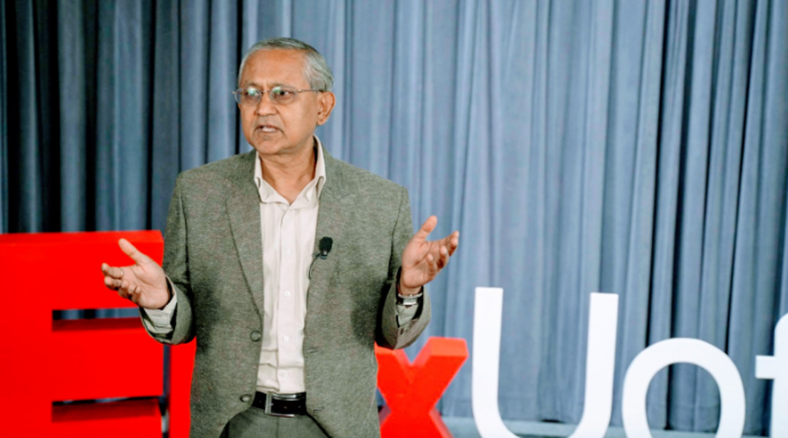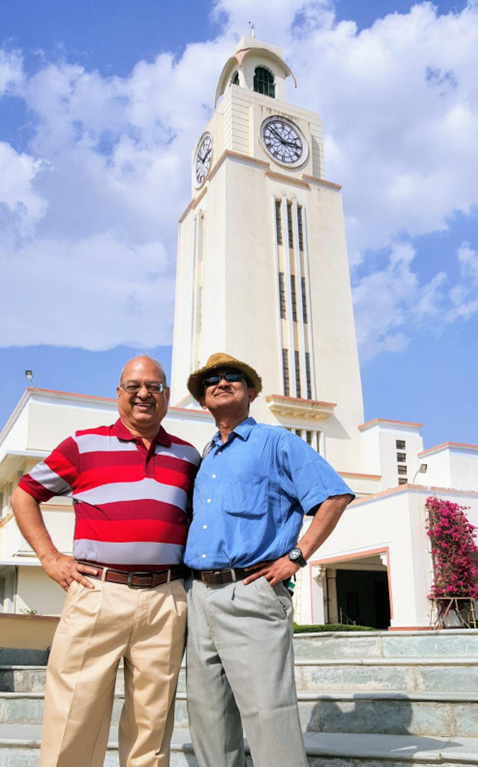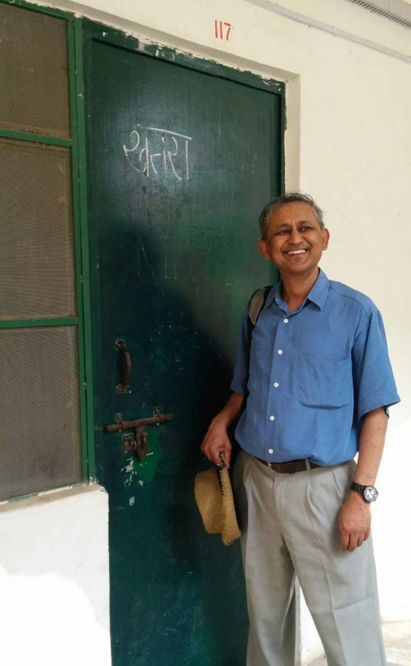Pioneering Paths: Prof. Amit Sheth's Impact on Computer Science and AI

A distinguished graduate from BITS Pilani (Pilani, '76), whose journey embodies a rich tapestry of roles as an educator, researcher, and entrepreneur. Armed with a BE (Hons) in Electrical and Electronics Engineering, Focused on "Computing for Human Experience," his AI research spans neuro-symbolic learning, knowledge-infused AI, and semantic computing. Addressing critical areas like healthcare and social welfare, his work emphasizes explainable AI and combating misinformation. Sheth's endeavors exemplify BITS Pilani's ethos of innovation, driving AI towards a more human-centric future.
How was your journey that ultimately led you to research?
My journey to research was shaped by a series of pivotal experiences and transitions. It started with my PS-I at ISRO’s Space Application Center and a follow-up summer internship. Thanks, BITS, for the flexibility that allowed me to have this exposure. The highly educated scientists and engineers I met at ISRO exposed me to research and innovation compared to routine development work. Also, while at BITS, I published and presented three papers at national seminars and conferences. In the late seventies, this was fairly unusual. These experiences helped me develop a deep-seated curiosity for academic excellence, and I realized that if I wanted to do research, I needed to obtain a Ph.D. Also, I must have done something right at ISRO because Dr. Yashpal, the director of SAC-ISRO, wrote a letter of recommendation for me, which likely made it possible for me to get into top departments in my area with full funding.
My first three jobs were at industry research labs, and I published profusely, which made it possible for me to transition from industry to academia because I felt I needed more freedom to pursue topics of my interest. My experience in helping build products at companies also prepared me for my entrepreneurial experiences, and by licensing in my own university research outcomes, I found four companies, including Taalee/Semagix, the first commercial search company more than a decade before Google did Semantic Search, and Cognitive Labs at the intersection of AI and emotion.
This dynamic journey, characterized by academic milestones and entrepreneurial ventures, has allowed me to bridge the gap between academia and industry, fostering innovation and collaboration across disciplines. Guided by a passion for pushing the boundaries of knowledge and creating real-world impact, I remain committed to making meaningful contributions to society through research, entrepreneurship, and preparing my Ph.D students for highly successful careers.


You have done a lot of work in computer science, but you have an electrical degree. Do you mind telling us if you found anything during your college experience that pushed you towards this field or where you might have first encountered this?
My journey into computer science began during my undergraduate years. While pursuing my EEE degree at BITS Pilani, I had the opportunity to explore various courses beyond the traditional curriculum. One particular course on data management and programming left a lasting impression on me. During this time, I had hands-on experience with programming languages like COBOL and worked with hardware such as the IBM 1130 at BITS, IBM 360 at Physical Research Lab, and PDP 11/70 at IIM-A. These were the best computers in India in the late seventies.
My internships at ISRO further solidified my interest in computer science. During my first internship, I developed a memory expansion for microprocessors, delving into the realm of hardware design. However, it was my second internship project that truly sparked my passion for software. I worked on optimizing communication between Earth and satellites by writing a Fortran program to implement the Walsh Hadamard transformation. This experience marked my first major introduction to software development.
A remarkable milestone that we saw in your journey was your meeting with the Prime Minister. Could you please elaborate more on your meeting and what you gained out of the entire meeting with him?
Well, I've known Modi Ji for over 50 years now. It's quite a journey! I first met him when he was pursuing his external MA in political science, taking courses with my father, a professor in the same field. I vividly recall our interactions, like riding a double-sawari on his bicycle to his place. Fast forward to my time in the US, I felt a strong urge to contribute to developing a research culture in India. Having experienced the stark contrast between Indian and US higher education, I was keen on fostering innovation back home.
During our meetings, I emphasized the importance of research universities in fostering innovation, drawing parallels with Silicon Valley's success story driven by institutions like Stanford and Berkeley. Modi Ji has a keen sense of the future and is already determined to use responsible AI for national transformation. But before deciding how to implement a plan, he usually consults experts and is the best listener I have met in my lifetime. Perhaps in this context, he invited me to meet him, and I was also asked to give the inaugural keynote on my perspective on AI to the third annual conference of Chief Secretaries chaired by him and attended by over 150 top officials, including all chief secretaries of the nation and many principle/additional secretaries. I took the opportunity to discuss how India can go beyond following the West on AI. In particular, I shared insights on neuro-symbolic AI, the next frontier in AI, and its use in addressing the challenges in sectors like healthcare, cybersecurity, and education, which Modi Ji has identified as priority areas.
Overall, it was a memorable experience to engage with a national leader like Modi ji, who not only comprehends complex technological concepts but also actively seeks expert opinions to drive policy decisions. It underscores India's potential for innovation-led growth, provided we address regulatory hurdles and prioritize research investment. No wonder he has found dedicated technocrats and technical leaders who have made India the world leader in digital public infrastructure. I hope this will be repeated for AI.
Many students at BITS and throughout the country are now keen on pursuing careers in AI, whether in research or industry. Do you have any advice you would like to offer to these students?
Absolutely. My advice may not be surprising. Initially, machine learning took center stage, then came deep learning with tools like TensorFlow and PyTorch. While these skills have value, they're more suited for service jobs. To truly develop your career or business, you need to go deeper. Understand the foundational aspects: how models work, what attention is, loss functions, and so on. Take courses in logic, knowledge representation, machine learning, and deep learning, and don't just stop at using tools. You must understand profoundly and learn to implement models from scratch. Engage in internships or projects to get hands-on experience and innovate. Presenting papers or projects is a way to validate your innovations. Ensure your innovations are deep enough to be hard to replicate easily. When starting a company, have a general idea that's marketable but a technology that's difficult to recreate. Surround yourself with the right people and find a good mentor. Success often depends more on the people you work with and the culture you immerse yourself in rather than just doing what is necessary to get a degree. So, focus not only on the technology but also on nurturing a research and work culture that fosters growth and innovation.
You told us about how you attended more classes and were academically ahead. Were you a part of any extracurricular at that time? And do you think that they were helpful in any manner?
I'm a firm believer in extracurricular activities. Let me describe its importance. I was in California two weeks ago, and a few of my BITS batch mates and I got together. The host has his vineyard and his wine. At these events, we don't remember the courses and classrooms. We remember the music club and some skits somebody might have done. You have to build memories. And that's an essential part of life. It is well known that kids who learn more than one language do better. Similarly, those who learn music or dance or do drama benefit in their intellectual development, too. Now, was I personally very active? Not in sports because my primary skill beyond education was music. So, I did play Tabla in a couple of programs at Oasis. But I have friends who did a lot more of it. It's a question of balance. But it should be there. It should not be your whole thing, and not attending class is not a great idea. But it would be best if you did both.
Can you recall any particular interactions with fellow students or faculty during your college experience that left a lasting impression on you?
Certainly, there are a few standout memories that come to mind. Firstly, several faculty members significantly impacted me, even beyond the classroom. For instance, Dr. Krishnamurthy, who taught mathematics, remains a cherished figure among students. Despite being retired, he continues to engage with us through social media, fostering a sense of connection that endures to this day. Another remarkable professor was Dr. L K Maheshwari, who, despite not teaching within my core area of interest, left a lasting impression with his exceptional teaching style.
One particularly vivid memory is of living in Vyas Bhavan’s wing, which is closest to the Saraswati Mandir. Waking up to the soothing sounds of music and bhajans from the Mandir every morning has stayed with me. Moments like these make me appreciate the unique sense of community that Pilani fostered, with the temple serving as a central institution in our memories of those years.
You Might Also Like
- BITS to Baker Hughes: Shad Hussain’s Journey Through Turbulent Times
- Be Cool: Navigating Life, Literature, and Mental Health with Shashi Warrier
- Coaching Across Cultures: Brajesh Bajpai’s Journey of Learning, Leading, and Adapting
- From Engineer to AI Leader: An Interview with Akhil Singhal on Startups, Strategy, and the Future of Gen A
- From Circuits to Capital Markets: Deepak Joshi’s Global Finance Journey














